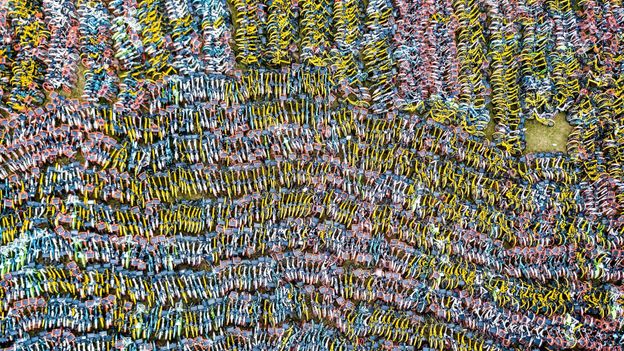A set of iconic photos from 2017 show brightly coloured fields which, at first glance, look like meadows filled with flowers in full bloom. It takes a while to register that the images aren’t of verdant fields, but ones filled with bicycles: hundreds and thousands of two-wheelers, stacked end-to-end in what came to be called China’s bicycle graveyards.
The fields were the remains of a countrywide boom-to-bust bike share scheme. The scheme had captured the world’s imagination for its innovative use of technology involving a smart digital lock and GPS. The digital lock innovation was a game changer for China, which was once known as the “kingdom of bicycles“, before the rapid growth of its automobile industry.
The bike share schemes presented a cost-effective alternative solution to traveling in cars, easing traffic congestion in the process. Ofo, one of the country’s most well-known bike share companies, had wanted to present a technology-driven transport solution that could serve the needs of people who wanted to travel short distances. They had aimed to match up the existing number of bikes in service with the number of people who needed them. The scheme was a hit with investors seeking green transport solutions for China. Ofo was not the only one to gain interest – its competitors such as Mobike and Bluegogo also garnered substantial interest from venture capitalists and investors.
But while these firms started off with healthy balance sheets, there was no regulatory framework under which these bikes might be gradually introduced and integrated into China’s existing public transport system. A sudden influx of what amounted to millions of bikes inundated China’s urban centres. The lack of regulation also allowed copycat bike share companies to spring up unchecked, so that at one point, there were more than 40 dockless bike share companies operating around the country, leading to an oversupply of shared bicycles.
You might also like:
The sudden growth of the industry meant that China’s biggest cities including Shanghai and Hangzhou had to create their own guidelines which were meant to ring fence its players, because by this point, bikeshare bikes were being vandalised, stolen or simply ditched. At one point, more than 3,000 of these two-wheelers were reportedly found in rivers in southern China after a clean-up operation. Bikes are still being uncovered in rivers and vegetation to this day.
The graveyards where excess bicycles and those causing a nuisance were dumped became a massive recycling problem. The digital locks were complex to recycle, with some of the bikes even came with their own micro-sized solar panels, which would charge the bike’s batteries when the two-wheelers were not being used, says Kurt Kamminer, a US-based collector of shared bikes. There were other challenges for recycling too, including the durable solid tyres that were hard to separate from the frames.











